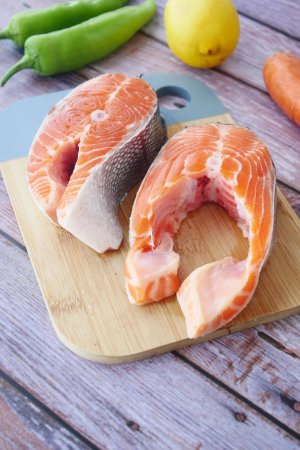Boost your heart health with this high-protein snack secret!
By
Aubrey Razon
- Replies 0
As we get older, keeping our hearts healthy becomes more important than ever. Heart disease is still the top cause of death, according to the U.S. Centers for Disease Control and Prevention (CDC), so making smart lifestyle choices is key to protecting our heart health.
One of the biggest things we can control is what we eat. The food we choose can either support our heart or work against it, making diet one of our best tools in the fight against heart disease.
When it comes to heart-healthy eating, the usual suspects often include fruits, leafy greens, whole grains, and low-fat dairy. However, there's a high-protein snack that's not only delicious but also packs a punch in the fight for heart health: salmon.
Salmon is a powerhouse of nutrition, offering a fantastic blend of protein and omega-3 fatty acids, which are essential for maintaining a healthy heart.
A mere 3-ounce serving of canned salmon contains about 20 grams of protein and nearly 80% of the recommended daily intake of omega-3s, all for just 142 calories.
These omega-3 fatty acids are known for their role in lowering blood pressure, reducing cholesterol levels, and improving fat metabolism—all key factors in preventing heart disease.
Another benefit of incorporating salmon into your diet is its high vitamin D content. Often referred to as the “sunshine vitamin,” vitamin D is crucial for heart health, and salmon provides almost all of your daily requirement.
This means you can skip the supplements if you're regularly enjoying this fishy treat.
While it's tempting to reach for a fish oil supplement to get your omega-3 fix, studies suggest that consuming salmon itself may be more beneficial.
A 2007 study published in Atherosclerosis found that men who ate about 4 ounces of salmon daily for four weeks experienced significant improvements in their cardiovascular health markers, including a reduction in blood pressure and triglycerides, as well as an increase in HDL cholesterol—the good kind that helps clear cholesterol from your blood.
Moreover, a 2013 study in Metabolism indicated that eating salmon might be more effective than taking fish oil supplements for fat metabolism. Participants who consumed fish directly showed an increase in adiponectin, a hormone that enhances insulin sensitivity and boosts fat metabolism.
While the benefits of salmon are clear, there are a few considerations to keep in mind.
Farm-raised salmon may contain higher levels of pollutants like polychlorinated biphenyl (PCB), which can increase the risk of obesity, type 2 diabetes, and stroke.
Conversely, wild-caught salmon, which is often what you'll find in canned form, may be exposed to heavy pollution in the waters where they're fished. Always check the product label to understand the sourcing of your salmon.
The American Heart Association recommends eating at least two servings of fatty fish like salmon each week, but some experts, like Professor Eric Rimm from the Harvard School of Public Health, suggest that eating fish daily can be part of a healthy diet—especially when compared to red meat.
One common concern with fish consumption is mercury levels.
However, canned salmon is known to have some of the lowest mercury levels, making it a safer choice, particularly for pregnant women and young children who are advised to avoid high-mercury fish like swordfish and tuna.
Adding salmon to your diet doesn't have to be a chore.
Canned salmon can be a convenient and versatile snack or meal component. Mix it into salads, spread it on whole-grain crackers, or enjoy it straight from the can for a quick protein boost. The key is to keep it simple and accessible, so you're more likely to make it a regular part of your diet.
Taking care of your heart is a lifelong journey, and every small step counts. By snacking on salmon, you're not just treating your taste buds—you're giving your heart the love it deserves. Let's make every bite count towards a stronger, healthier heart!
 Have you discovered creative ways to enjoy salmon? Do you have heart-healthy recipes that you swear by? Share your experiences and ideas in the comments below. Let's inspire each other to make heart-smart choices every day!
Have you discovered creative ways to enjoy salmon? Do you have heart-healthy recipes that you swear by? Share your experiences and ideas in the comments below. Let's inspire each other to make heart-smart choices every day!
One of the biggest things we can control is what we eat. The food we choose can either support our heart or work against it, making diet one of our best tools in the fight against heart disease.
When it comes to heart-healthy eating, the usual suspects often include fruits, leafy greens, whole grains, and low-fat dairy. However, there's a high-protein snack that's not only delicious but also packs a punch in the fight for heart health: salmon.
Salmon is a powerhouse of nutrition, offering a fantastic blend of protein and omega-3 fatty acids, which are essential for maintaining a healthy heart.
A mere 3-ounce serving of canned salmon contains about 20 grams of protein and nearly 80% of the recommended daily intake of omega-3s, all for just 142 calories.
These omega-3 fatty acids are known for their role in lowering blood pressure, reducing cholesterol levels, and improving fat metabolism—all key factors in preventing heart disease.
Another benefit of incorporating salmon into your diet is its high vitamin D content. Often referred to as the “sunshine vitamin,” vitamin D is crucial for heart health, and salmon provides almost all of your daily requirement.
This means you can skip the supplements if you're regularly enjoying this fishy treat.
While it's tempting to reach for a fish oil supplement to get your omega-3 fix, studies suggest that consuming salmon itself may be more beneficial.
A 2007 study published in Atherosclerosis found that men who ate about 4 ounces of salmon daily for four weeks experienced significant improvements in their cardiovascular health markers, including a reduction in blood pressure and triglycerides, as well as an increase in HDL cholesterol—the good kind that helps clear cholesterol from your blood.
Moreover, a 2013 study in Metabolism indicated that eating salmon might be more effective than taking fish oil supplements for fat metabolism. Participants who consumed fish directly showed an increase in adiponectin, a hormone that enhances insulin sensitivity and boosts fat metabolism.
While the benefits of salmon are clear, there are a few considerations to keep in mind.
Farm-raised salmon may contain higher levels of pollutants like polychlorinated biphenyl (PCB), which can increase the risk of obesity, type 2 diabetes, and stroke.
Conversely, wild-caught salmon, which is often what you'll find in canned form, may be exposed to heavy pollution in the waters where they're fished. Always check the product label to understand the sourcing of your salmon.
The American Heart Association recommends eating at least two servings of fatty fish like salmon each week, but some experts, like Professor Eric Rimm from the Harvard School of Public Health, suggest that eating fish daily can be part of a healthy diet—especially when compared to red meat.
One common concern with fish consumption is mercury levels.
However, canned salmon is known to have some of the lowest mercury levels, making it a safer choice, particularly for pregnant women and young children who are advised to avoid high-mercury fish like swordfish and tuna.
Adding salmon to your diet doesn't have to be a chore.
Canned salmon can be a convenient and versatile snack or meal component. Mix it into salads, spread it on whole-grain crackers, or enjoy it straight from the can for a quick protein boost. The key is to keep it simple and accessible, so you're more likely to make it a regular part of your diet.
Taking care of your heart is a lifelong journey, and every small step counts. By snacking on salmon, you're not just treating your taste buds—you're giving your heart the love it deserves. Let's make every bite count towards a stronger, healthier heart!
Key Takeaways
- Salmon is a high-protein snack that also provides significant omega-3 fatty acids, which are beneficial for heart health.
- Regular consumption of salmon can lead to improved blood pressure, reduced cholesterol levels, and better fat metabolism, potentially reducing the risk of heart disease.
- While salmon is a healthier option compared to fish oil supplements for obtaining omega-3s, one must consider the source of salmon due to possible contaminants like PCBs in farm-raised salmon.
- Canned salmon, often wild-caught, is recommended by health experts and has lower levels of mercury, making it safe for frequent consumption and a better choice than fish high in mercury, especially for pregnant women and young children.







